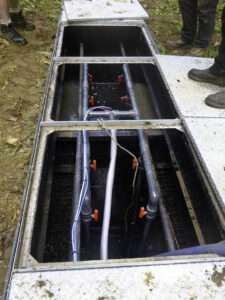Sewerage System Guidelines: What Can I Flush – and What Shouldn’t I?

The Treatment Plant.
TO ALL BROCKHAMPTON PARK, MEWS, AND WEST LODGE RESIDENTS AND TENANTS
It is such a privilege to live in wonderful historic buildings situated on beautifully kept grounds in one of the most sought after areas of England. With that privilege come some significant responsibilities with respect to the maintenance of the house and environs, not only the parts you see, but also the fragile and not so attractive infrastructure.
In this document, I will talk about the much taken-for-granted sewage disposal system, a VERY fragile part of the infrastructure, which continues to be pressured by inhabitants lifestyle and comfort level changes. Refurbished and added bathrooms with new pressurised water systems provide better water pressure but also an increase in the volume of wastewater. New, wonderfully convenient hygiene products, which find their way into the system, but should NOT.
Portions of the drainage system date back to the original construction of the Victorian part of the property, but the old treatment facility dating back to the conversion of the property into flats was completely replaced by a modern, up-to-date installation last year. Clogged drains and foreign matter in the new system will cause problems, however, which require repair. Unclogging and jetting drains can often fix a bad drain situation, but can cause other problems, too.
In short, the only things that should be flushed or allowed down the drains are:
• water
• toilet tissue
• human waste
• moderate amounts of soap and cleaning products (preferably those that are “green”)
• minimal amounts of small particle foodstuffs that result from washing dishes
Now for the extensive list of DO NOT FLUSH OR ALLOW DOWN THE DRAINS items! Some may seem obvious (but are apparently not to everybody, as they have been found in our clogged drains or floating in the septic tank, fouling up the system). Also others, that are not so obvious or considered to be a problem.
• facial tissues (Kleenex, etc.) Toilet tissue is made to breakdown when wet, other paper products to remain strong when wet
• cotton swabs
• feminine hygiene products (pads, tampons, etc)
• any wet wipes (they may say “ flushable” but that only means they are small enough to flush, but they do not break down)
• large amounts of hair
• dental floss
• pharmaceuticals
• kitchen roll/paper towels (strong when wet)
• newspaper
• clothes dryer sheets
• disposable nappies (diapers)
• incontinence pads or pants
• condoms
• any type of kitty litter (including that which may stick on feces or clump in urine, even if it is advertised as flushable. Again that means it will go down the toilet, but it can cause major problems.
• any type of fabric
• dirt, as cleaning hiking boots or flower pots in a sink or bath
• cigarette butts
• coffee grounds
• tea bags
• eggshells
• chemicals (paint, paint thinners, varnish, oils, used cooking oil, motor oil, pesticides, rug cleaner, etc.)
• chewing tobacco
• grease from cooking
• floor wax
• excessive amount of household cleaners of any kind
• never use drain unclogging products
We all would appreciate not having to spend money clearing blockages or repairing our new system!
OWNERS RENTING PROPERTY SHOULD ENSURE RENTERS ARE ADVISED OF THESE RESTRICTIONS.
Thank you!
Management Committee of Brockhampton Park.
Danna Cuin 10/3/20
